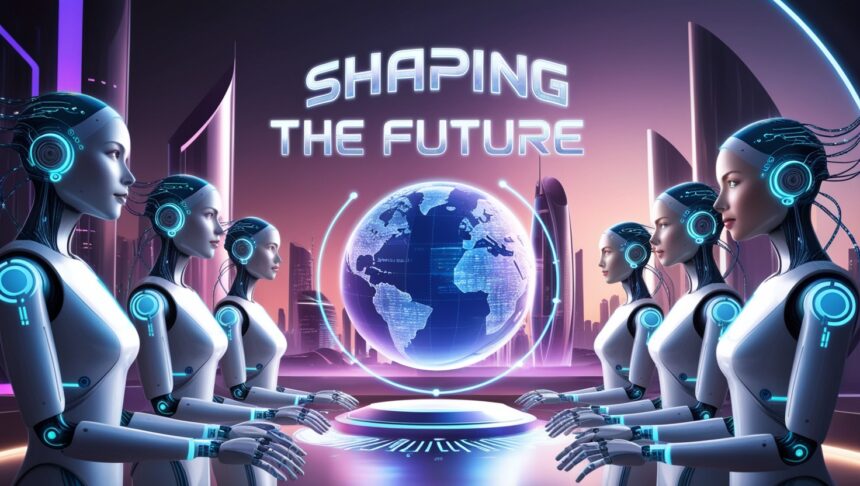In this article, I will discuss how AI assistants are shaping the future by transforming industries, enhancing productivity, and redefining customer experiences.
From automating tasks to providing personalized support, AI assistants are driving innovation and efficiency.
As technology advances, their role will continue to expand, making them essential in both business and everyday life.
Key Points & AI Assistants Shaping the Future List
| Key Point | Description |
|---|---|
| Automation & Efficiency | AI assistants streamline tasks, boosting productivity. |
| Personalized Experiences | They offer tailored recommendations and support. |
| Enhanced Customer Service | Improve response time and customer satisfaction. |
| Data-Driven Insights | AI analyzes data for better decision-making. |
| Workforce Transformation | Redefine job roles and create new opportunities. |
| 24/7 Availability | Provide round-the-clock support and services. |
| Improved Accessibility | Assist individuals with disabilities using voice and text. |
| Continuous Learning | AI evolves through machine learning and feedback. |
AI Assistants Shaping The Future
1.Automation & Efficiency
AI assistants streamline operations by automating repetitive tasks and allowing staff to shift focus onto strategic initiatives.
For example, Telstra AI tools like AskTelstra provides answers to questions by AI searching for the needed information as compared to staff manually searching for it. In the retail sector, AI systems are utilized in managing inventory and processing retail orders.

Everything is done with minimum possible mistakes and much faster. With this Automation, productivity improves while operational costs reduce, which will help businesses use resources more wisely.
2.Personalized Experiences
AI assistants provide tailored recommendations and services for analysis, therefore engaging customers for the overall better experience.
As an example, in fashion retail selling generative AI marketing is reshaped, selling and customer satisfaction increased.

By analyzing single user data, AIs are able to conduct individual interactions and enhance brand loyalty.
3.Enhanced Customer Service
With AI, chatbots and virtual assistants have been enhanced, and now with the help of AI powered systems customers can interact with chatbots directly and get immediate response to their asks and attendants are getting improved.
Macquarie Group AI chatbot increases productivity and timely assistance by helping more than 6,000 staff a week.

These AI systems improve customer satisfaction and efficiency by allowing agents to answer more complex issues while addressing routine questions themselves.
4.Data-Driven Insights
AI technology enables informed decision-making by uncovering pertinent patterns from extensive data. In Finance, AI analyzes market data to develop investment strategies, while in healthcare, it uses medical records to assist in disease diagnosis.

These insights allow organizations to prepare for market shift, optimize processes, and devise proactive plans enabling them to remain competitive.
5.Workforce Transformation
The integration of AI assistants shifts job roles towards more productive work, requiring collaboration between workers and machines.
Companies like Infosys retrain staff to complement AI in their day to day tasks, which increases productivity without job losses.

This collaboration also inspires new innovations as employees use AI to enhance their capabilities, creating new positions in response to the growing demand for skilled labor.
6.24/7 Availability
AI assistants ensure constant support is available in all industries making them significantly useful. For example, AI customer support platforms assist users outside normal business hours, providing better customer service and customer retention.

This feature meets instant responses requirement for today’s digital world increasing user engagement and satisfaction.
7.Improved Accessibility
AI assistants help integrate physically challenged individuals into society by providing the needed help.
Voice-activated commands allow an individual with mobility challenges to achieve a level of independence, while AI transcription services make it easier for those with hearing impairments to understand speech.

These innovations help break the gap in information and services and enable all people to actively participate more in the society.
8.Continuous Learning
AI assistants improve with time using machine learning techniques by recognizing and reacting to user inputs. As an example, AI powered customer service systems use previously stored calls to serve the next customers with greater precision at each interaction.
These technologies are changing with time, which gives room for AI assistants to continue delivering the desired goals set by the users while promoting change and consortia.

In conclusion, by automating processes, AI assistants are transforming industries and making them more personalized, while inclusive giving rise to a new, more efficient and easily accessible world.
AI Assistant Evolution
Initially, AI assistants started as basic rule-oriented chatbots, but nowadays, AI assistants have advanced to complex decision-making agents.
Rule-based traditional chatbots could only respond to simple queries resulting in frustrating and ineffective user experiences.
Unlike traditional chatbots, modern AI assistants can understand context due to the incorporation of multimedia intelligence, which includes text, voice, images, and data.
The integration of these features allows AI personal assistants to analyze real-time data, understand higher-level requests, and personalize solutions to customer and employee needs.
Enhancing Customer Experiences
AI assistants are revolutionizing customer service by providing immediate, accurate, and personalized responses.
Unlike traditional self-service tools, modern AI assistants can handle multi-step, decision-intensive scenarios, offering solutions that are both contextually relevant and timely. This capability not only elevates customer satisfaction but also fosters loyalty and trust.
Challenges and Considerations
Despite their numerous benefits, the integration of AI assistants presents certain challenges. Ensuring data privacy and security remains a critical concern, as these systems often handle sensitive information.
Additionally, there is a need for continuous monitoring and updating to prevent and mitigate biases inherent in AI algorithms. Establishing robust governance frameworks and adhering to ethical guidelines are essential to address these issues effectively.
Future Directions
The future of AI assistants holds immense potential. As these systems continue to evolve, they are expected to become even more intuitive and capable, further blurring the lines between human and machine interactions.
Innovations in natural language processing, machine learning, and cognitive computing will drive the development of AI assistants that can anticipate user needs, offer proactive solutions, and seamlessly integrate into daily life and business operations.
Industry leaders emphasize the transformative impact of AI. Reid Hoffman, co-founder of LinkedIn, describes AI as a “huge intelligence amplifier” that enhances human capabilities and agency. He advocates for the deep integration of AI tools to remain competitive in this rapidly evolving landscape.
Conclusion
To sum up, AI assistants are changing the future for the better by improving efficiency, enhancing functionality, and spurring innovation. AI assistants are vital to any industry because of their ability to automate processes, offer data-driven insights, and work continuously.
With the ever-changing technology, AI assistants will further adapt to the needs of people, businesses, and the world; making interactions quicker and more efficient AI Assistants AI assistants have the potential to transform the future for the better.




